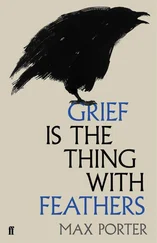“I should go,” she said aloud, but Dr. Fie was already directing her to her work, to the switches that needed to be thrown, the valves that needed to be turned. There were a hundred different tasks split among the four of them, and every one had to be done in an order that was as precise as music. “Bless you,” she said again to Mr. Whitman as she settled the spiked hat on his head.
As the gears started to turn, she thought her doubt would fall away. When she saw how it looked to be doing something, how the steam engines steamed and the lights lighted, she thought that mechanical competence would indicate supernatural competence, and her doubt would shrivel. But the thing was roaring away gloriously and still she thought it was folly, just an enormous monument to Gob’s grief that was beautiful and complex, but no more likely to raise the dead than an ordinary lever. Maci found herself planning a future for herself and her husband. Her neurasthenia would remit, and she would be strong for both of them because he would collapse in a wreck of disappointment. He’d be so weak and sad he’d not be able to speak for months, but she’d take him away to Europe, and fortify his ailing spirit with a tour of great museums. Slowly he’d come back to life, and they would return to America in time for Maci to help Mrs. Woodhull organize her next bid for the Presidency in 1876.
Even when the impossible light came on, so bright it seemed to shine through them all, she didn’t believe. But then she thought, Maybe somewhere tonight in this city a dog will die of loneliness and neglect, and then in the next moment it will rise again. And then she thought, Maybe it will be a child who gets up out of his deathbed to kiss the face of his mother. She heard a keening, which she mistook for the noise of a grieving mama, but it was Mr. Whitman, crying out from within his crystal house. As he screamed more forcefully, her belief grew, until it was three babies, ten men, a hundred women who would rise from death that night. As he writhed and screamed, making the most horrible noise she’d ever heard in her whole life, Maci believed and believed and believed. It was like a muscle in her, swelling as she flexed it over and over. Her weariness evaporated — she thought she saw it pass away, a little wisp of gray smoke that bled out of her eyes with the tears. There was the other thought still in her, dwarfed by the joy of faith, that she had come all this way to wreck this machine, too, that it was her sacred responsibility to smash it. Hadn’t crude fate let her practice one such destruction? But she paid very little attention to this thought.
Instead, she considered how it was wonderful that a machine could manufacture faith and put it in you, how it could abolish doubt, and that this was perhaps more miraculous than the abolition of death. She held on to a pipe that was hot on one side, cold on the other, while the whole house shook and her husband cried out exultantly. With her right hand she raised her left to her cheek and cried out, “Rob!” and there was a picture in her mind as perfect as a photograph, a scene in which he was alive again, marching through the gate in the machine with Private Vanderbilt at his side. “They’re coming!” she shouted, because she believed it.
Gob was standing outside the gatehouse, chanting words Maci could not understand. His hair was standing up ridiculously on end. Maci put her hand to her head and discovered that hers was doing the same. She heard breathing, and singing, a beautiful sound of plaintive voices, and over that Mr. Whitman’s terrific screaming. There was another sound, too, a rude knocking, as if someone was at the door trying to disturb them in this exquisite moment. She had a notion it must be Mr. Comstock, come to arrest her, but actually it was Dr. Fie, who, having tried to open the door to Mr. Whitman’s crystal house and found it locked, was banging his fist on its walls. Every time he struck the noise changed — now it was like a knock on wood, now it was like a brass gong, and now it was the delicate chime of two glasses struck together in a toast to success. Gob walked slowly towards him, and when he was close he shouted a question at him. In answer, Dr. Fie pushed him away, and when Gob came at him again Dr. Fie struck him in the face.
Pickie came clambering down off a scaffold and leaped on Dr. Fie. They struggled a little, and Gob came rushing again at them, shouting words that Maci thought she could see leave his mouth as gusts of wind to knock Dr. Fie back against the glass. He shook his head, holding Pickie at arm’s length. When Gob reached him, Dr. Fie pummeled him with the boy, hitting him as if with a big stick. Maci came to them just in time to see him smash Pickie against the glass wall. It cracked with one blow, shattered with the next. Pickie seemed not any worse for the abuse. He clawed at Dr. Fie’s face, and cursed. Dr. Fie threw him across the room.
“Help me,” Dr. Fie shouted at Maci, over a new noise, a disharmony in the singing. Mr. Whitman was still screaming, louder now that his voice wasn’t contained by the house. “It’s killing him!” he shouted.
Maci shook her head. “Dr. Fie,” she said incredulously, “don’t you understand that there is no more death?”
“Oh, Mrs. Woodhull,” he said. “There is for him .” She put her hand on Dr. Fie to stop him when he tried to go in, and he thrust her back as he entered, so that her head knocked into Gob’s head as he was coming up behind her. Gob was saying “No!” again and again, and Maci had the thought that he must have looked just this way, weeping and protesting, at the grave of his brother. There was a surge of breathing and singing. The light flared from the giant lens, and Maci heard a popping in her head, similar to what she’d heard in the caisson, as if there’d been a precipitous shift in the pressure of the air. She felt nauseated, and fell to her knees, thinking she would vomit.
“Will,” Gob said softly — Maci picked his voice out among all the great noise as if it had been spoken in a quiet room. “You’ll ruin it all.” Pickie Beecher ran into the house, only to be ejected. He bounced on the floor like a ball.
Gob went into the crystal house after Dr. Fie, and there they grappled over Mr. Whitman’s body. While Mr. Whitman arched and screamed in his chair, they pounded each other in the head and face. Maci shouted, “Stop! Stop!” but they paid her no heed, or didn’t hear her at all. Dr. Fie brought his two hands together, cranked them back, and struck Gob in the face with such force that blood flew and coated the wall of the house with perfect round drops. Gob staggered, and fell, and Dr. Fie took that opportunity to wrest Mr. Whitman from the chair.
All the noise stopped suddenly, started again and stopped. The floor lurched, and the great lens fell out of its supports. It came crashing down on the gate, splitting it in two. In the quiet before the machine noise started again — a coughing and choking sound in it now — she realized that Mr. Whitman was no longer screaming. He came out of the house, leaning against Dr. Fie, who draped him against Maci and said, “Take him out of here.” When Maci tried to push Mr. Whitman back into the house, Dr. Fie shoved her roughly aside, and hurried away with the poet even as Maci called for him to return.
Her balance was off, or the floor was heaving like liquid, or both — she could barely guide herself through the door of the house, to where Gob was slowly rising to his feet. His nose was crooked and bloody, and blood had stained his teeth and his mouth and his torn lips. “Come away,” Maci said to him. His hands were slick with blood. He pulled them easily out of hers and shook his head.
“To where?” he asked. With great calm and precise deliberation, he set himself down in Mr. Whitman’s chair and set the hat on his head. “You may go out, but there is no other place for me.” Something crashed very nearby, and a moaning sound started up amid all the choking and coughing and intermittent singing. The floor threw her into him, and he pushed her away, an expression of terror and hatred now on his face from which Maci nearly fled. He shouted at her then, without any words she could make out, or perhaps he was shouting because he was feeling the same agony as Mr. Whitman had. She thought his yelling blew her back and forced her away from him, but really it was Dr. Fie, his big hands tangled in her dress and her hair, who dragged her back through the open crystal door, through the crumbling spaces that used to be parlors, over the nubs of walls. As she receded from him, she saw Gob begin to writhe and kick in the chair. She saw little Pickie, trapped under a giant gear, wriggling his limbs like a bug and shouting for his brother. Dr. Fie would not stop to assist him.
Читать дальше












